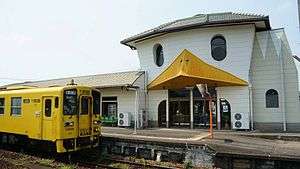Tanushimaru Station
Tanushimaru Station (田主丸駅, Tanushimaru-eki) is a railway station on the Kyūdai Main Line operated by JR Kyushu in Kurume, Fukuoka Prefecture, Japan.[1][2] Tanushimaru is noted for having a section of the station building specially shaped to resemble the head and beak of a Kappa, an aquatic Yokai which is associated with the town.
Tanushimaru Station 田主丸駅 | |
|---|---|
 Tanushimaru Station in 2013 | |
| Location | Japan |
| Coordinates | 33°20′20″N 130°41′32″E |
| Operated by | |
| Line(s) | ■ Kyudai Main Line, |
| Distance | 20.8 km from Kurume |
| Platforms | 2 side platforms |
| Tracks | 2 + 1 siding |
| Construction | |
| Structure type | At grade |
| Bicycle facilities | Bike shed |
| Disabled access | No - platforms linked by footbridge |
| Other information | |
| Status | Kan'i itaku station |
| Website | Official website |
| History | |
| Opened | 24 December 1928 |
| Traffic | |
| Passengers (FY2016) | 600 daily |
| Location | |
 Tanushimaru Station Location within Japan | |
Lines
The station is served by the Kyudai Main Line and is located 20.8 km from the starting point of the line at Kurume.[3] Only local trains on the line stop at the station.
Layout
The station consists of two side platforms serving two tracks at grade. A siding branches off track 1. The station shares a building with a local tourism association and information centre. The tourism association also acts as a kan'i itaku agent and manages the ticket window which is equipped with a POS machine but does not have a Midori no Madoguchi facility. Access to the opposite side platform is by means of a footbridge. A bike shed is located at the station forecourt.[2][3][4]
- A view of the station facade. The part with the yellow beak is the tourism information centre. The station building is the single storey structure to the right of it.
- A view of the station platforms and tracks. The siding can be seen in the distance to the left.
History
Japanese Government Railways (JGR) opened a track from Kurume to Chikugo-Yoshii on 24 December 1928 during the first phase of the construction of the Kyudai Main Line. Tanushimaru was opened on the same day as one of several intermediate stations on the track. With the privatization of Japanese National Railways (JNR), the successor of JGR, on 1 April 1987, JR Kyushu took over control of the station.[5][6]
Passenger statistics
In fiscal 2016, the station was used by an average of 600 passengers daily (boarding passengers only), and it ranked 226th among the busiest stations of JR Kyushu.[7]
References
- "JR Kyushu Route Map" (PDF). JR Kyushu. Retrieved 23 February 2018.
- "田主丸" [Tanushimaru]. hacchi-no-he.net. Retrieved 7 April 2018.
- Kawashima, Ryōzō (2013). 図説: 日本の鉄道 四国・九州ライン 全線・全駅・全配線・第4巻 福岡エリア [Japan Railways Illustrated. Shikoku and Kyushu. All lines, all stations, all track layouts. Volume 4 Fukuoka Area] (in Japanese). Kodansha. pp. 34, 73. ISBN 9784062951630.
- "田主丸駅" [Tanushimaru Station]. jr-mars.dyndns.org. Retrieved 7 April 2018. See images of tickets sold.
- Ishino, Tetsu; et al., eds. (1998). 停車場変遷大事典 国鉄・JR編 [Station Transition Directory - JNR/JR] (in Japanese). I. Tokyo: JTB Corporation. p. 227. ISBN 4533029809.
- Ishino, Tetsu; et al., eds. (1998). 停車場変遷大事典 国鉄・JR編 [Station Transition Directory - JNR/JR] (in Japanese). II. Tokyo: JTB Corporation. p. 739. ISBN 4533029809.
- "駅別乗車人員上位300駅(平成28年度)" [Passengers embarking by station - Top 300 stations (Fiscal 2016)] (PDF). JR Kyushu. 31 July 2017. Archived from the original (PDF) on 1 August 2017. Retrieved 3 March 2018.
| Wikimedia Commons has media related to Tanushimaru Station. |